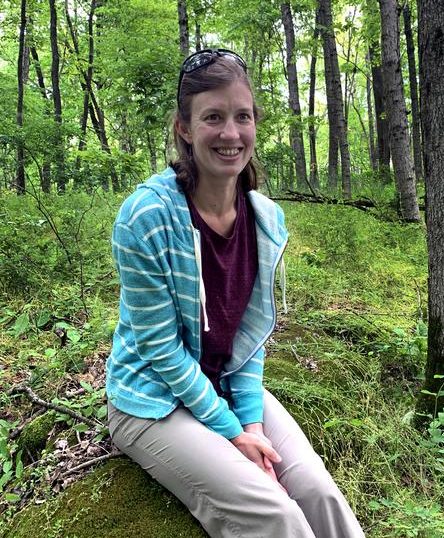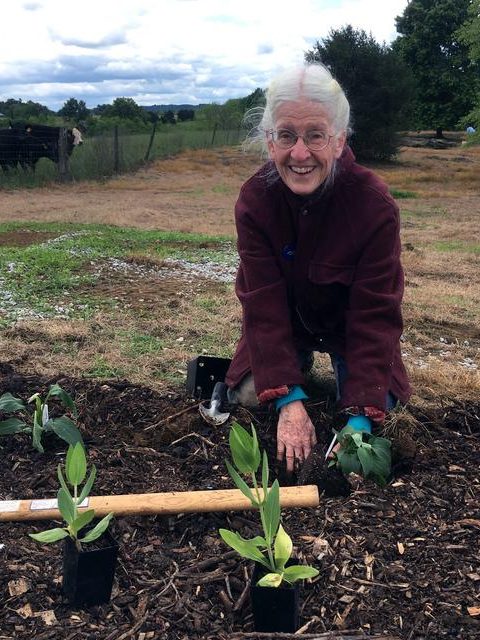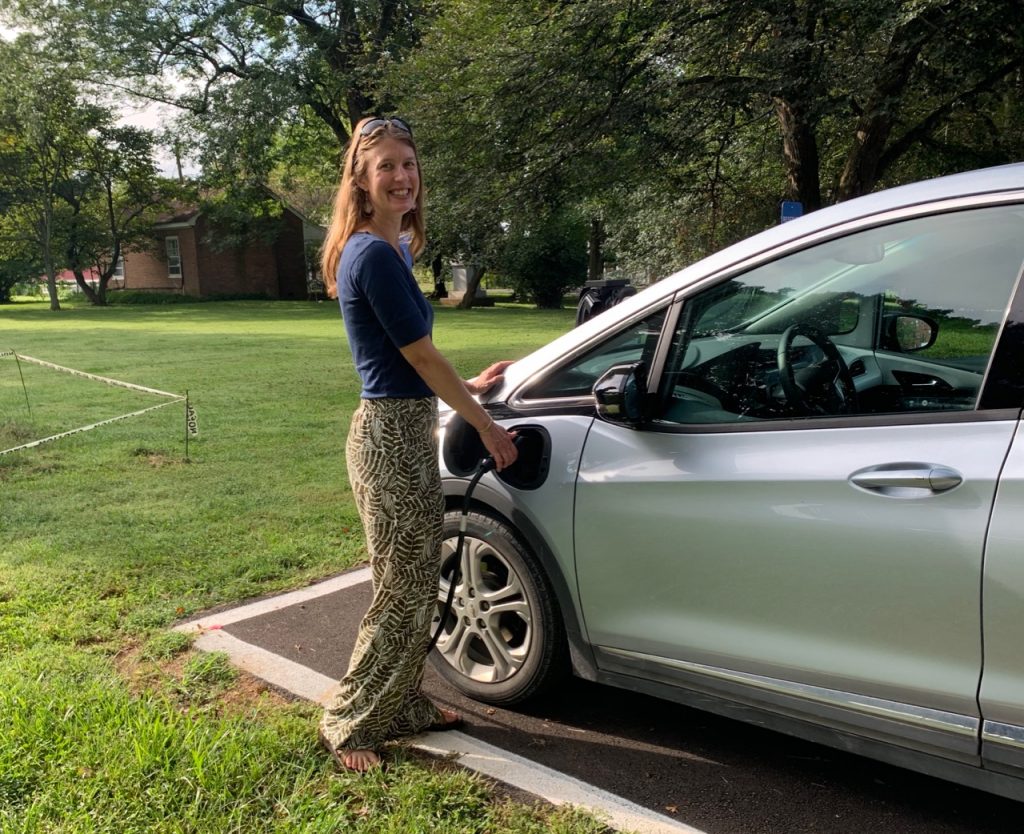Loretto & Earth
Posted on July 13, 2021, by Christina Manweller
‘… I looked to Earth to teach me, to show me her ways of caring, creating, protecting and letting go.’
Jessie Rathburn CoL in her eco-autobiography
Step by step for Earth
In conversation with Jessie Rathburn CoL

Photo by Jessie’s husband, Andy Dyrsten
Jessie Rathburn grew up close to the land in the Texas hill country. Her parents, educated in biology, shared their love of the natural world with their two daughters. “Is the moon waxing or waning?” “What type of cloud is that?” They were questions that centered Jessie and her older sister within creation. Their parents modeled stewardship of the land and its biodiversity by lovingly tending the 5 acres on which they lived. So it’s not a surprise that, after working with immigrant families in Texas, volunteering in Russia, teaching in academia, Jessie found herself yearning to live and act from the creation-honoring values she’d learned as a child. She quit her job as a founding senior instructor at the English as a Second Language Academy at the University of Colorado to run an urban farm, growing produce for the local community and vegetable starts for school gardens. The garden was destroyed when the City of Denver took back the land to build high-end condos and a parking garage.
Jessie started her journey with Loretto when she attended young adult retreats. After a few years of attending retreats and getting to know Loretto, she decided to enter the process to become a co-member and began interning with Loretto Earth Network. She formally entered the Community in 2015 and now serves as Loretto’s Earth Education and Advocacy Coordinator. Jessie’s excitement about Loretto’s commitment to honoring Earth and living responsibly is palpable. She loves that it’s not a new stance for Community members; for decades they have been asking what changes they could make in their daily lives to effect change and heal Earth. They’ve changed their eating habits, worked to reduce their carbon emissions, planted trees, recycled, reused, repurposed.
I found myself both a part of Earth and loving and being loved by Earth.
Jessie Rathburn CoL
Habits of simple living and making ecologically responsible choices are ingrained, and progress naturally from the personal to the institutional level. Jessie points to the solar panels installed at Loretto’s Denver Center nearly 10 years ago that are still in use, the recycling trailer and electric vehicle charger at the Motherhouse, the Carbon Offset Fund and the deep commitment to continuing to do the work to care for Earth.

Photo by Susan Classen CoL
Jessie emphasizes the importance to Loretto of “preserving the Motherhouse lands so that trees lovingly planted by Loretto over the years that have been sequestering carbon continue to do so.” The Motherhouse in Kentucky, at 788 acres, includes about 300 acres of woodlands and the farm, which is carefully managed through the use of cover crops, crop rotation, rotational grazing, minimal chemical use and no tillage. Seventy-eight acres of the farmland is enrolled in the Conservation Reserve Program and planted in hardwood trees, native grasses and pollinator attracting flowers. In addition, there are about 200 acres in pasture and hay and 200 in row crops (corn, soybeans).
The remaining land is made up of water (lakes, ponds, streams), the Cedars of Peace retreat grounds and the Motherhouse campus, including the Infirmary. Jessie bought an electric car, grows as much of her family’s food as she can, reveres, learns and shares her knowledge with Loretto and beyond. She believes in doing what’s right for Earth, in spite of an uncertain future. “There’s a sense of hope that comes from letting go of the outcomes and living into that way of being.”
Start by doing what’s necessary, then do what’s possible, and suddenly you are doing the impossible.
Attributed to St. Francis
Jessie and Loretto are looking ahead, living into the crucial questions. “Where are our greenhouse gas emissions coming from? How do we build infrastructure for a sustainable future? What are the substantial changes that we can plan for so that we can make those changes over the next 20 or 30 years?”
Loretto’s goals
The Loretto Land Ethic, adopted in 2006, begins: “As friends of Mary at the Foot of the Cross we are called to care for Earth in its pain, to celebrate its beauty and to create space for its healing.” Jessie Rathburn CoL says, “I’ve relied on those three elements in my work as a general framework. In a nutshell, for me, that’s the goal of our relationship with Earth.”
In 2018, Loretto made three commitments by adopting these Assembly resolutions:
- Significantly mitigate our impact on climate change and ecological degradation.
- Explore sustainable housing/intergenerational living.
- Determine how to preserve the Motherhouse lands in Kentucky.
Acting for Earth
As I have grown in relationship with Earth, I have found that, more and more, I am called to witness.
Jessie Rathburn CoL
Using our prophetic voice
“Faith communities have a prophetic role in the world; we can use our moral voice to make a clear call for change, and that is really, really important, says Jessie Rathburn CoL. Loretto has a long history of speaking up to stop Earth-damaging practices, from nuclear waste disposal to the pipeline threatening Bernheim Forest in Kentucky to climate change.
“It is so important for communities like ours to use our voice and to advocate for change because no matter how many changes we make in our individual lives and our own properties, it’s those broader societal changes that have to happen in order for real change to come about.”
Addressing environmental injustice
Minority and low-income communities “have little access to environmental benefits but bear most of the environmental burdens — pollution, land loss, negative health effects, etc.,” Jessie notes. Decisions affecting these communities are often made without their input.
Jessie shares the initial steps Loretto Community members are taking: Many participate in the Leadership Conference for Women Religious discussions called “Exploring Intersections: Catholic Sisters on Racism, Migration and Climate;” the Farm and Land Management Committee is delving into Black farmers’ experiences in Kentucky and historic lack of access to land for farmers of color; the Loretto Earth Network Coordinating Committee invites farmers of color to share their experiences; the Latin America/ Carribean Committee looks at where migration and climate change intersect (for instance, farmers in Central America have been forced to leave their land due to extreme weather events). The goal: to listen, learn and move forward effectively with humility and compassion.

Taking steps to address the carbon emergency
Loretto’s Carbon Offset Fund uses donated money to pull back and store carbon from the atmosphere (e.g. by planting trees and native grasses) or to prevent putting out more carbon (e.g. by installing solar panels, electric vehicle chargers, etc.). All donations go to projects that support these goals. Donors often contribute to the fund to compensate for carbon they are responsible for adding to the atmosphere — for example, when they travel.
If we don’t curtail the temperature rise, we can expect growing drought, food scarcity, water shortages in vulnerable areas, increasingly severe storms and flooding, sea level rises with the resulting loss of homes and habitat, escalation of wildfires and increased loss of biodiversity and extinctions. Jessie explains the numbers behind the reality: “If we’re going to keep our temperature rise at 1.5 degrees Celsius [the tipping point determined by scientists] we have to bring our emissions down by 7.6 percent every year for the next decade.”
You can find more information on the Carbon Offset Fund here.
